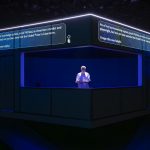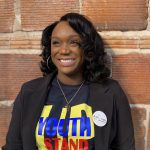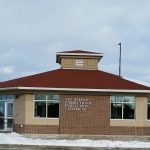Tim Clausen Hears Voices
By John Hughes
Tim Clausen, 43, is sitting motionless in his darkened East Side home, concentrating. Within my view are several stacks of books, towers of videos and CDs, an elderly upright piano, a forest of plants, and this lean individual, listening with both ears. He is listening to the voices of deep pain, a network of desolation, on a CD which he has recorded and produced.
The CD is entitled, The Voices of September 11: The Families, and that is just what it is. Without sound effects, mood music, or Hollywoodish voice-overs, the CD is simply an hour of brutally honest interviews with families who have survived the death of a loved one. Tim is the one interviewing them on the CD, probing openly, honestly, and gently, listening with a compassion indicated by his groans and appropriate chuckles. He has recorded over 80 hours of conversations with the bereaved, giving the CDs to the families he’s interviewed, as keepsakes he calls “Lifeworks legacy-interviews,” time capsules made “so kids can get to know their Dads through this.” He has distilled the 80 hours into one, for the rest of us, to hear, and contemplate and remember.
“I see the point of the airplane in my living room,” says the mother of one of the pilots whose plane smashed into the World Trade Center. “Repeatedly. I sought out a psychiatrist, because I keep seeing the fire in my living room. I never knew death was so bad. But there’s nothing I can do.”
“We were hearing reports that they were pulling out live people from the rubble, but I didn’t want my husband down underneath there with a hundred broken bones, bleeding” says one widow. “So I went outside and went out to the top of the street, and just lost it. And I prayed to God, ‘Please tell me he’s with you, and not suffering down here terribly. Just give me a sign.’ And moments later, I looked up, and saw a shooting star. And this huge rush came over me and I thought, ‘Oh my God. He’s home. He’s with God now, and I need to accept that. I knew he wasn’t coming back.”
The listening is harrowing, it revisits the horror of those events, now nearly two years old, but Tim is unflinching, in both the interviewing, and the listening with me. He’s looking straight into the horror. For the general populace, those events are beginning to recede into history, but for the bereaved, their loved ones are dead again today. Tim Clausen has extended a hand to a few of those many still grieving.
A mentor sows the seeds of change
Tim was born and raised in Oconomowoc, by his own admission “did extensive research and development with chemicals,” dropped acid daily for months on end, and, by the age of 16, found himself in a treatment center. There, he met the man who was to change his life, an Episcopal Bishop, Chandler Sterling, who was visiting to “take fifth steps,” which means listening to people give an account of their past actions.
“I ran into him out on a patio. He was reading the landscape and grounds there like the Native Americans do, showing me how a branch hanging low indicated the presence of underground water. We struck up a friendship. He was brilliant, spiritual, free thinking, and he became my mentor.
“Chandler died in 1983, and, after bumbling through several more years of booze and drugs, I finally got clean 14 years ago, when my son was a year old.” It is obvious the help he received from his friend is now being offered to others.
A legacy for the survivors
I ask Tim why he is doing these legacy interviews for the survivors, why, out of 270 million Americans, he might be the only one reaching out in this way.
“Because I care,” he says. “I’m a helper person. I just feel like it’s something I need to do. I truly feel led to do it. The compilation CD really just evolved over the course of many months and interviews, and it’s actually an audio documentary of our worst national disaster. Besides, all this research helps make up for the dullness of my personal life.” He winks.
He’s been through his own dark time, his pain, his confrontation with his self, and been helped by a godsend. Now he has the courage to make himself available to others, without fanfare or drama, without judgement.
On the evening I visited him, as we listened, we heard people crying, expressing love, resiliency, faith, ongoing grief. One mother who lost a son says, “I don’t care about anything. I just feel like half of my life is wasted.” You hear the depths of her agony.
At least she has a safe person in whom to confide.




















